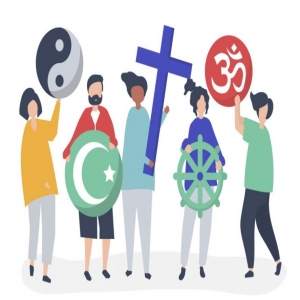
.jpg) Bishop Dominic Savio Fernandes
Bishop Dominic Savio Fernandes

India takes pride in being the world's largest democracy, upholding its secular credentials, where every citizen is guaranteed the right to religious freedom. The founding fathers of the Indian Constitution, conscious of India's pluralism, enshrined in Article 25 the fundamental right to "profess, practice and propagate" one's religion freely in accordance with one's conscience, subject only to public order, morality and health.
Article 19(1)(a) safeguards freedom of speech and ex
Yet, in stark contrast to this constitutional vision, several states in India have enacted the "Freedom of Religion Act," which is in fact an anti-freedom act that denies people the moral obligation and the fundamental right to follow their God-given conscience.
This so-called "Freedom of Religion Act," which should have been termed as "Anti forced-Conversion Act" in the first place, ostensibly meant to protect religious freedom and prevent forced conversions or conversions through "fraud, or inducement," have instead become an instrument of harassment, particularly targeting religious minorities like Christians.
The very name "Freedom of Religion law" is a misnomer. Instead of safeguarding the individual's right to freely convert to any religion of one's choice, these laws place restrictions on conversion itself. They invert the logic of liberty: instead of protecting freedom, they presume guilt. Once arrested, the burden of proof rests not on the complainants but on the accused, who must prove their innocence. This turns the principle of justice upside down, and the law becomes, not a shield, but a sword — wielded by fundamentalists to target religious minorities.
There have been indications, in various media outlets, of widespread misuse of the "Anti-Conversion Acts," which have been masked as "Freedom of Religion Acts" in many States across India, despite there being little or no evidence of forced conversions. As a result, families have been torn apart by false complaints and pastors and lay Christians have been jailed merely on suspicion.
A case in point is the incident that took place at Durg in Chhattisgarh on July 25, 2025, where two innocent nuns from Kerala's Assisi Sisters of Mary Immaculate, along with tribal youth Sukaman Mandavi, were jailed on trumped-up charges of human trafficking and attempting forced conversion, as reported in the media.
They were accompanying three adult tribal women (aged 18-23) from Narayanpur to Agra for voluntary domestic work, with parental consent documents in hand. No evidence of conversion or trafficking existed - the women were long-time Christians. They were jailed despite the women's affirmations of free will. Whereas Durga Vahini member Jyoti Sharma, who mobbed the group, used aggressive and derogatory language and coerced false statements from the women, went scot-free.
Videos showed police inaction as the nuns were harassed. After eight days, a Bilaspur NIA court granted them conditional bail on August 2, 2025, noting the baselessness of the FIR. This incident exemplifies how the law enables third-party complaints to jail innocent people, while attackers roam free.
Independent media sources indicate that complaints are often driven by suspicion, prejudice, or local vendettas, rather than coercion. Even prayer gatherings, peaceful acts of worship, or charitable works are frequently misconstrued as attempts at conversion. The mere presence of a Christian prayer meeting in a village can provoke a complaint, leading to police intervention, arrests, jail and prolonged legal battles for the falsely accused.
Even when acquitted, the stigma lingers, and the community suffers. Far from protecting vulnerable populations, these laws embolden vigilante groups who take it upon themselves to "police" religious activities. Innocent Christians have been assaulted, their worship services disrupted, and their very right to faith criminalised—all under the cover of the "Freedom of Religion Act."
The tragedy of these said laws is that they directly contradict the very Constitution they claim to uphold:
1. Article 25(1): guarantees freedom of conscience and the right to profess, practice, and propagate religion, including voluntary conversion.
2. Article 19(1)(a): protects the right to express and share religious beliefs with others.
3. Article 21: ensures personal liberty, including the freedom to choose one's faith.
By punishing those who convert of their own free will, these laws erode fundamental rights, reducing religion from a matter of personal conscience into one of state control.
If India is to remain faithful to its secular and democratic ideals, the misuse of the "Freedom of Religion Act" must be addressed urgently.
True religious freedom lies in safeguarding individual choice, not restricting it. The essence of Indian democracy is that every Indian, regardless of one's religious affiliation, has the right to follow one's conscience without fear of reprisal. Until the "Freedom of Religion Act" is reformed or repealed, this freedom remains under grave threat.